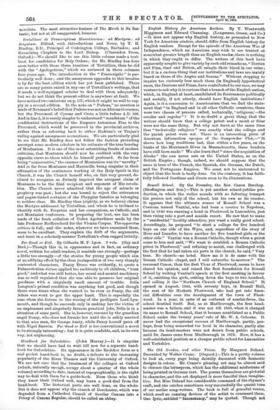English History for American Readers. By T. Wentworth Higginson and
Edward Charming (Longman, Green, and Co.) —It does not appear why English history, as presented to New York for American readers, should differ from English history for English readers. Except for the episode of the American War of Independence, which an American may wish to see treated at somewhat greater length than an English reader, there is nothing in which they ought to differ. The writers of this book have apparently sought to give variety by such odd remarks as, " Iberian and Finn, Gael and Briton, all mingle their blood in our veins ; but it is a curious thing that our institutions and laws are mainly based on those of the Angles and Saxons." Without stopping to inquire too curiously how much those (in England) hypothetical races, the Iberians and Finns, have contributed to our race, we may venture to ask why it is curious that a branch of the English nation, which, in England at least, annihilated its forerunners politically and socially, if not utterly, should have English institutions ? Again, is it a concession to Americanism that we find the state- ment that " in England and in all other Catholic countries, there were two classes of persons called, technically, religious,'—the secular and regular" ? It is no doubt a great thing that the writers should know that a college priest and a monk or friar were not the same thing. But why not learn at the same time that " technically religious " was exactly what the college and the parish priest were not. There is an interesting piece of American information apropos of the Gunpowder Plot,—" It shows how long traditions last, that within a few years, on the banks of the Merrimack River in Massachusetts, these bonfires have still been made." We also learn that " since the acquisition of Alaska" the sun never sets on the United States, as on the British Empire ; though, indeed, we should suppose that the same is true of the French, the Spanish, the German, the Dutch, and the Portuguese Empires. We must not be understood to object that the book is badly done. On the contrary, it has faith- fully followed Gardiner and Green even to its illustrations.


















































 Previous page
Previous page